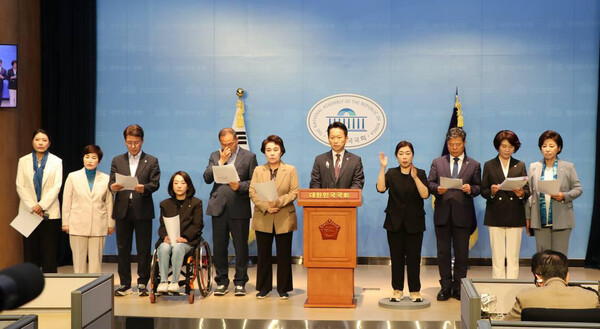The medical community is cautious about adding more doctors, but the political community’s pressure is intense.
After the government announced its intention to increase the medical school enrollment quota, politicians demanded that it be allocated to new medical schools.
The government has decided to expand the number of medical school students and is coordinating its size and timing.
On Wednesday, Minister of Health and Welfare Cho Kyoo-hong said at the National Assembly's Health and Welfare Committee that the government would "prepare to increase the number of medical school students for the 2025 university entrance examination."
The government is considering an idea by which President Yoon Seok Yeol will announce the medical student enrollment quota increase as early as next week.

However, lawmakers of the opposition Democratic Party of Korea also demanded that the government not only expand the number of medical school students but also establish public and regional medical schools while introducing regional doctors. It was a policy that the DPK pushed during the previous Moon Jae-in administration.
DPK lawmakers, who are members of the Assembly’s Health and Welfare Committee, held a news conference on Friday, saying, "We feel relieved and welcome that the government has finally decided to expand the number of medical school students, albeit belatedly.”
However, they expressed concern that the government is "showing a lukewarm attitude" to establishing public medical schools and regional medical schools.
"The goal of expanding the number of medical school students is not just to increase the number of doctors, but to expand the essential, public, and local medical infrastructure and ensure that residents can receive proper and safe medical care anywhere in the country," the Democrats said. “The expansion of medical school seats should be combined with the establishment of public medical schools, the creation of regional medical schools, and the introduction of provincial doctors.”
Suppose the number of medical school students increases without the establishment of public medical schools. In that case, it will only increase the number of cosmetic and plastic doctors in the metropolitan area."
The DPK lawmakers pointed out that "the core of the crisis in the healthcare system is due to the shortage of doctors" and that "measures to increase the number of doctors are urgently needed."
"The government's plan to expand the number of medical school students must include the establishment of public medical schools, the creation of regional medical schools, and the introduction of community doctors," they said. "No amount of medical school enrollment quota increase will solve the challenge of expanding the essential, public, and local medical infrastructure."
Medical community calls for policies to ensure adequate staffing levels
However, the medical community is cautious about increasing the number of doctors. It is particularly negative about new medical schools. Even those in favor of expanding the number of medical school students are opposed to new medical schools.
In an article published in the latest issue of the Korean Medical Association's e-newsletter, Dr. Lee Sang-woon, vice president of the Korean Medical Association, emphasized that the priority should be to improve the system to ensure that the current crop of doctors is appropriately deployed.
In particular, he said there is no long-term plan for fostering healthcare workers and that an organization like the Advisor Committee for Medical Manpower Planning (ACMMP) in the Netherlands should be operated independently.

